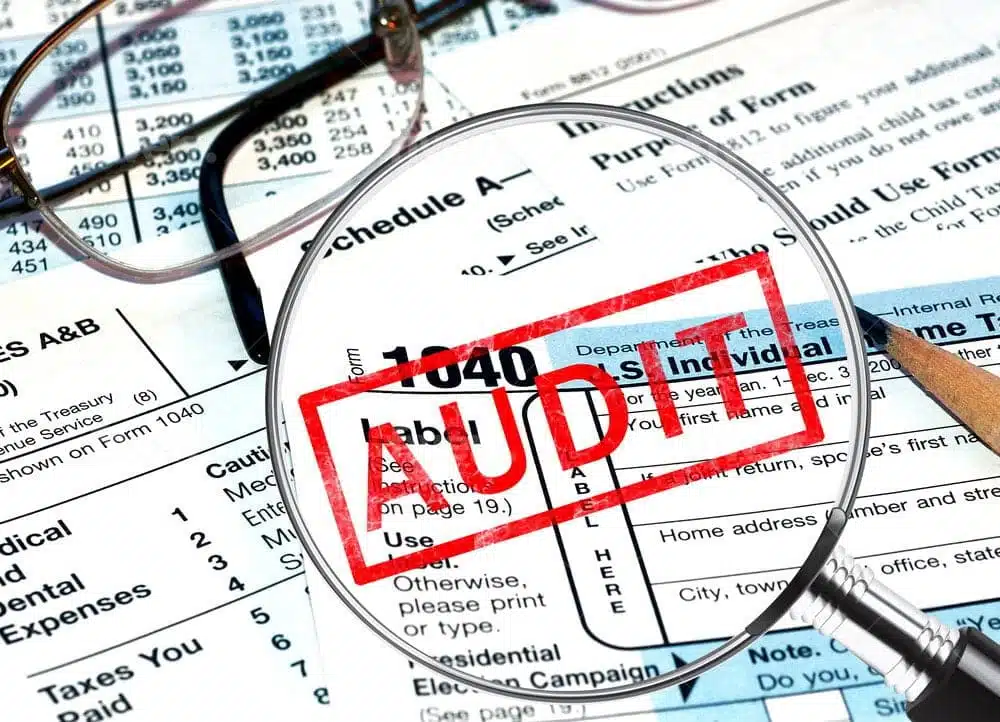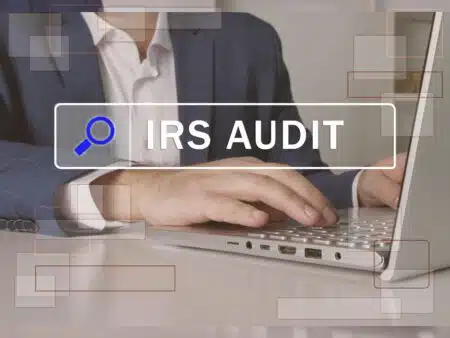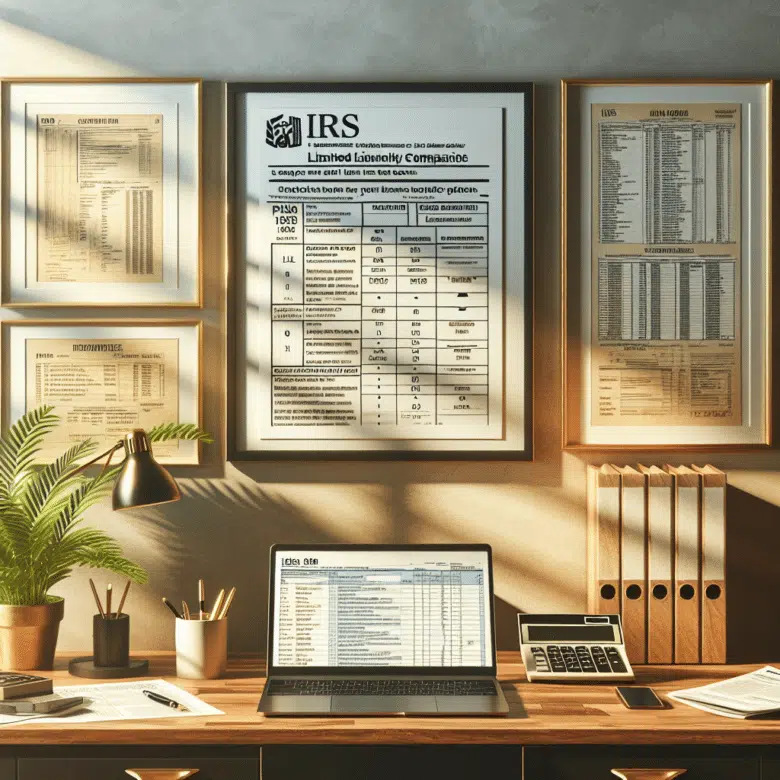Avoid Getting Audited by the IRS
Filing your tax return can be stressful, especially if you worry about attracting the IRS’s attention. With recent changes in IRS funding and a renewed focus on enforcement, you might be more concerned about the possibility of an audit, especially on tax day. This guide explores factors that can significantly increase your chances of being audited and provides a comprehensive overview of what the IRS audit triggers. Additionally, we’ll discuss how professional tax services, like those offered by APC 1040 and a certified public accountant (CPA), can help you navigate these complexities and reduce your audit risk, ensuring that your tax return can withstand scrutiny.
Understanding how you get audited by IRS
Despite popular belief, the majority of individual tax returns are not audited. In recent years, the IRS has audited less than 1% of all individual income tax returns filed for the 2020 tax year according to IRS data. However, if you are one of the unlucky few to be audited, it’s important to understand the process and your rights. The IRS has up to three years to assess additional taxes after conducting an audit, though they can request an extension to this. (You are not legally required to accept the extension.) And they have three years after the audit to issue a refund if one is due to you.
Even though the Inflation Reduction Act provided the IRS with an extra $80 billion over 10 years for increased enforcement, most taxpayers won’t feel the impact of heightened audits immediately, especially with the majority of audits being conducted through mail in the form of a correspondence audit. However, if you are selected for an audit, it is important to comply and submit records for an examiner to review in order to protect your rights and ensure a fair process. Understanding the impact of the Inflation Reduction Act funding on IRS audits can help taxpayers better prepare for potential audits and navigate the process effectively.
Mail is the most common Audit
Most audits occur via mail, so taxpayers often don’t meet an IRS agent in person. However, certain factors can significantly increase your chances of being selected for an audit, also known as tax audits. These factors include the amount of income reported, the complexity of the return, the types of deductions or credits claimed, and whether you own foreign assets. Understanding the process and reasons behind IRS audits, including specific information provided in the notice, is crucial for taxpayers to avoid potential issues and provide any additional information requested by the IRS, including field audits and ensuring the accuracy of their reported tax amount.
Key Audit Red Flags
While there’s no foolproof way to predict an IRS audit, understanding common IRS audit triggers can help you stay clear from unwanted attention. Here are some red flags that could raise your audit risk:
High incomes
The chances of being audited rise with increased income. The IRS gives more attention to those with high incomes because their capacity for underreporting income and taking questionable deductions is greater. Taxpayers earning over $200,000 are audited at a much higher rate than those earning less.
Unreported Income
The IRS runs income reported against forms received via its computerized system, such as W-2s and 1099s. Any mismatches are flagged for audit. For example, if you receive a 1099 form for freelance work and fail to report that income, the IRS will notice the discrepancy and may audit your return, especially if it involves unreported income from sources like NerdWallet.
Large Charitable Deductions
While charitable giving is laudable, the claiming of disproportionately high charitable deductions raises a red flag in the IRS. If the contributions of one to charity are out of proportion with the person’s income and that of other similarly situated taxpayers, the IRS may undertake a closer examination of such deductions for the tax year.
Home Office Deduction
This home office deduction is often scrutinized. It’s essential to ensure that your home office qualifies under IRS rules and that you have the proper documentation to prove it in case of an audit. The space must serve only a business purpose and be used consistently.
Business Expenses
Claiming excessive business expenses, especially when they are not typical for your profession, can attract attention. For example, if you’re a freelance writer and claim high travel expenses, the IRS may question whether these expenses are justifiable for your line of work.
Rental Losses
The IRS keeps a close watch on rental real estate losses, especially if you claim to be a real estate professional. To qualify as a real estate professional, you must spend more than 750 hours a year and more than half of your working hours materially participating in real estate activities. Failing to meet these criteria could trigger an audit.
Foreign Accounts and Assets
Failure to report foreign accounts and assets has substantial penalties and enhanced risk of audit. The IRS requires that taxpayers file reports on foreign financial accounts where the aggregate value of those accounts exceeds $10,000 at any time during the year; failure to do so will result in considerable fines and possible criminal charges.
Cash Businesses.
The IRS will audit business enterprises dealing with a considerable amount of cash, such as restaurants and salons, due to perceived under-reporting of their income. Since the Internal Revenue Service understands that cash transactions are much harder to track down, they scrutinize these businesses with more stringency to ensure that income is reported precisely and that careful records are kept.
Rounded Numbers
The use of round numbers as opposed to actual amounts. Good record-keeping is important. Suppose you have $5,000 in office expenses. The IRS will immediately question you whether that amount was estimated rather than actual. Always use exact figures from records.
Dependents Claimed
It is important to know that you qualify for all the dependent claims, especially in the case of shared custody. The IRS enforces strict laws about who qualifies as a dependent, and any discrepancies between parents’ returns may trigger an audit. Providing extensive documentation, such as birth certificates and custody agreements, helps support your claim. Don’t forget to include your child’s name and social security number as well, as this is crucial information for claiming dependents on your tax return.
Alimony Deductions
Post-2018, alimony payments are no longer deductible for the payer or taxable for the recipient due to changes in tax law. Ensure you follow current laws and avoid claiming these deductions if they are no longer applicable.
Early Withdrawals from Retirement Accounts
The problem is that such withdrawals often include penalties and taxes, which raise a red flag with the IRS. As seen in this case, anyone who takes an early distribution from an IRA or 401(k) must follow proper procedures and pay any owed penalties.
Hobby Losses
If one claims losses from a hobby that is considered a business, such activities are likely to be audited. The Internal Revenue Service differentiates between hobbies and profit-motivated activities. One must show a profit motive and keep complete records of revenues and costs.
High Medical Expenses
Although taxpayers can deduct medical expenses, filing excessively high expenses compared to income may raise a red flag for an audit. The IRS allows deductions for medical expenses that exceed 7.5% of adjusted gross income, so taxpayers should thoroughly document very high claims with receipts and medical records.
Claiming 100% Business Use of a Vehicle
It is rare that a vehicle will be used solely for business. You would have to keep meticulous records to substantiate your claim. The Internal Revenue Service requires you to maintain mileage logs with other records to prove the business usage of your vehicle.
Large Miscellaneous Deductions
These deductions often need detailed documentation. Failure to provide sufficient proof will result in an audit. Examples include unreimbursed employee expenses and investment-related expenses. Always keep receipts and records to support your claims.
Freelancers and Independent Contractors
It is also very common to audit individuals who receive 1099s if the expenses and incomes don’t match. The IRS closely examines self-employed people for correct income reporting and accurate deduction claiming. Keep meticulous records of all income and expenses.
The Earned Income Tax Credit (EITC)
This credit is frequently abused, so claims are highly scrutinized. The IRS has a special program in place to verify the accuracy of EITC claims. Make sure you meet all the eligibility criteria and provide accurate information to avoid triggering an audit.
Math Errors can put you under scrutiny
Simple mathematical errors can also raise the red flag for an audit but generally do not lead to a thorough investigation. To minimize mathematical errors, double-check your math and consider using tax software or a professional tax preparer.
How to Avoid an IRS Audit
While some of these factors are beyond your control, you can do the following to help reduce your audit risk:
- Report All Income: Ensure all income, including freelance and investment income, is accurately reported. Use the forms provided by employers and financial institutions to match the reported amounts.
- Keep Detailed Records: Maintain thorough documentation for all deductions and credits claimed. Organized records can substantiate your claims and provide evidence in case of an audit.
- Avoid Guesswork: Use exact figures instead of rounded numbers to avoid raising suspicion. Accurate figures demonstrate attention to detail and reduce the likelihood of errors.
- Understand the Law: Stay informed about current tax laws and ensure compliance. Tax laws can change, and staying updated helps you avoid mistakes.
- Use Professional Help: Hiring a tax professional can help you navigate complex tax situations and reduce the likelihood of errors. Professionals have the expertise to handle intricate tax matters and ensure accurate filing.
The Role of Professional Tax Services
Navigating the intricacies of tax law can be daunting. Professional tax services, such as those offered by APC 1040, can provide invaluable assistance. Here’s how they can help:
- Expert Knowledge: Tax professionals stay updated on the latest tax laws and regulations, ensuring your return is compliant and optimized. Their expertise helps you take advantage of deductions and credits while avoiding pitfalls.
- Accurate Filing: Professionals reduce the risk of errors that can trigger an audit. They pay close attention to detail to ensure accurate reporting of all information.
- Audit Support: If you are audited, a tax professional can guide you through the process, helping to respond to IRS inquiries and provide necessary documentation. Their support can make the audit process less stressful.
- Tax Planning: Beyond filing, tax professionals can help with long-term tax planning, identifying strategies to minimize your tax liability. Effective tax planning can lead to significant savings over time.
- Peace of Mind: Knowing that your taxes are handled by experts can provide peace of mind, allowing you to focus on other aspects of your life and business. Professional assistance reduces the burden of tax-related stress.
FAQs
What are common triggers that can lead to an IRS audit?
Common triggers that can lead to an IRS audit include discrepancies in reported income, high-income levels, claiming excessive deductions, inconsistent information on tax returns, and engaging in cash transactions. Being aware of these red flags can help you avoid the unwanted attention of the IRS.
How does the IRS select individuals or businesses for audits?
The IRS uses various methods to select individuals or businesses for audits, including random selection, related examinations to audited accounts, and documents matching to third-party reports. Additionally, high-income earners and those with complex tax returns are more likely to be audited by the IRS.
What should you do if you receive an audit notice from the IRS?
If you receive an audit notice from the IRS, stay calm and review the information to understand why you were selected. Gather all relevant documents to support your tax return and respond by the deadline with accurate information. Consider seeking professional help to guide you through the process.
Are there any red flags that might increase your chances of being audited by the IRS?
Certain red flags can increase your chances of being audited by the IRS. Like excessive deductions, inconsistent income reporting, high-income levels, and running a cash-based business. Keeping accurate records and being honest in your filings can help reduce audit risks.
Conclusion
While the IRS audits a small percentage of tax returns, certain factors can increase your chances of being selected. Understanding these IRS audit triggers and taking steps to avoid them can help you minimize your audit risk. However, the complexities of tax law can be challenging to navigate on your own. Hiring professional tax services, such as those offered by APC 1040, can provide the expertise and support needed to ensure accurate filing and reduce your audit risk. Don’t leave your tax matters to chance—seek professional help and gain confidence in your financial future.





